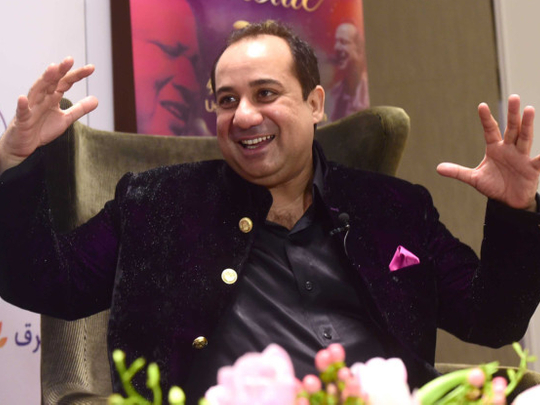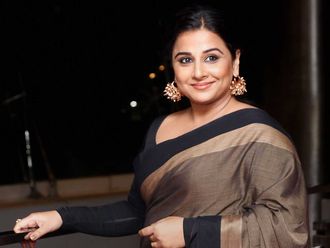
It is never easy growing up in the shadow of a legend. The comparisons are infinite and sometimes downright cruel.
For Pakistani Sufi (devotional) singer Rahat Fateh Ali Khan, finding a foothold in the very industry that saw his uncle, the late Nusrat Fateh Ali Khan, reign supreme was no easy feat. Especially when the apprentice was thrust into the spotlight overnight, after the sudden death of Nusrat at 48.
Left with few choices, Rahat pushed his grief aside to carry forth his mentor’s 600-year legacy and share the teachings of the King of Qawwali to a new generation of fans.
Two decades later, Rahat reflects upon those early years growing up with his ‘Khan sahib’, sharing intimate details with Gulf News tabloid! and revealing how disheartened Nusrat would be today with musical traditions dying out in the face of Bollywood and Coke Studio (TV series with live studio recorded performances).
Tell us about the tribute concert at the Dubai World Trade Centre you’ve got planned.
Many have paid tribute to Nusrat Fateh Ali Khan in the past and they will probably continue to do so in the future as well. However, this year marks 20 years since he passed away. This is a special moment for us and his fans. So, this time we hit upon the concept of hosting 48 concerts that paid tribute to 48 years of his life [his age when he passed away]. The final concert is taking place on December 15 at the Dubai World Trade Centre.
Nusrat’s catalogue of crowd favourites is a detailed one. How does one even start narrowing down the set list for a concert?
If I won’t make the selection, then who will? I spent my life with him. Yes, we’ve had to take into account his fans as well and include songs that had to be sung before he left the concert venue. Songs such as Saanso Ki Maala, Sanu Ek Pal, Mera Piya Ghar Aaya, Jaaniya, Dholna...
There must have been countless memorable moments of your time spent with Nusrat. Which is your favourite?
It’s a very beautiful memory [laughs]. If you recall, Khan sahib was a big man and I used to be a skinny young boy — so tiny that even a strong gust of wind could have knocked me over. I think I was six at the time, when I would go over and play with him. Khan sahib would be lying in bed and I would climb on top of him, pretending that I was scaling a large mountain. If you think about it, even today, I am have reached the top only because of him.
We’ve heard about his legendary temper…
He was temperamental, yes, but not all the time. He didn’t suffer fools well. When a mistake was made during practice or during performance, he had no patience for it. He would tell you to get out straight away. Although, he never yelled at me when I was a kid. It was only when I was a little older that he turned disciplinarian and that’s when I realised, oh, that’s what you call a mistake.
Anyone who’s ever worked him has stated Nusrat was a perfectionist to a fault. Was there ever a time when he complimented your music in those early years?
Yes, he was happy with me once. At a concert we hosted at Royal Lancaster Hall in central London... actually, Dorchester. I remember, seated in the audience were [Bollywood actors] Amitabh Bachchan and Vinod Khanna, along with [former Pakistani cricketer turned politician] Imran Khan and [The Rolling Stones frontman] Mick Jagger. My performance was very good and many people appreciated it. And that was perhaps the first and the last time, Khan sahib told everyone that I was his son. It’s a moment I will never forget.
If he was among us today, would he be happy with the way the music industry in Pakistan and India is faring?
He most certainly would not be happy. He would have put an end to this wrong kind of revolution in music, just like he did it the last time… when we had the onslaught of cheap music in the ’90s. He came out with Mast Kalandar at the time and changed everything overnight.
So, what’s stopping it now?
Because Sufis don’t exist anymore. Those were the men and women who brought about a revolution in music. People like Nusrat Fateh Al Khan. Or Pandit Jasraj [and] Pandit Ravi Shankar. What we see around us today under the guise of Sufi music are fakes. And what is that old saying: a bad smell travels faster. Pure fragrance takes its time.
Surely, platforms such as Coke Studio exist for the very reason to do away with the gimmicks and promote good talent.
Coke Studio has done good work in the past, yes. But this year [season 10] has been a flop for Coke Studio. It is a crystal clear story. Nobody put any effort [into it]. The song that I was supposed to sing was given to someone else. A track meant for someone else was given to me. This is not how it works.
Are you referring to your Coke Studio rendition of the Junoon classic, ‘Sayonee’ [the song received mixed responses from fans and critics]?
Yes, I am talking about Sayonee. But at least we managed to sing it in tune. What excuse do the others have?
Why wasn’t there any objection by you or other artists involved in Coke Studio?
Because they have changed now. If you aren’t faithful to your music or your people or your work, then who will care anymore?
Was this the reason behind launching your own qawwali institute and a film production house? To bring quality music back to the fore?
It is exactly this very reason. We are working on organising classical music festivals in a bid to promote qawwali there and produce films that promote music. Perhaps people lack the talent as yet, but at least there’s a stable platform available to promote this as an art form. The problem we face is that people are simply not learning anymore. I was blessed because I was mentored by Khan sahib. He never received the status I achieved today. But I say, there aren’t any teachers like him today.
Is commercial Bollywood music or even Coke Studio the reasoning behind traditional music slowly dying out?
The holy pilgrimage for singers today ends with Bollywood or Coke Studio. They think, now that we’ve found success on these platforms, are career has reached its pinnacle. That is not how it works.
There should be platforms to promote real music as well. But acclaimed artists wouldn’t be caught dead attending such events. Why? Because you lack the real talent to perform.
Isn’t the onus on artists such as yourself to bring about a change?
Someone needs to approach me first! How am I supposed to go from home to home searching for good talent? There’s only one medium left and that is YouTube. We can give lessons but people need to be willing to learn. I have a channel of my own. I teach music. If you have what it takes, come find me.
QUOTE-UNQUOTE
“Khan sahib was such an absent-minded, simple man that he didn’t even know how to shave himself. I would shave his beard, polish his shoes and even dress him,” said Rahat Fateh Ali Khan, when asked about his uncle, the late Ustad Nusrat Fateh Ali Khan.
The legend of Ustad Nusrat Fateh Ali Khan
Revered as the King of Qawwali, Ustad Nusrat Fateh Ali Khan’s genius drew compliments and collaborations with legendary musicians including Peter Gabriel, Eddie Veeder of Pearl Jam and even Mick Jagger.
Khan’s powerful vocals, coupled with a versatility that few could match, introduced Sufi religious music to a global audience. This spiritual annotation paid tribute to the penmanship of noted poets, with qawwali being Khan’s medium to bring this sound to a world stage.
Despite a musical lineage that dated back 600 years, it is said that Khan’s father wanted his son to choose medicine over music. But the talented young man took a path of his choice and was hosting concerts in big cities across Pakistan by the time he was 16.
Khan’s repertoire of music continued to grow, bringing mainstream qawwali to the masses with songs such as Kinna Sona, Mere Rashke Qamar, Dholna and Afreen Afreen. The maestro was known for speeding up the qawwali beat to appeal to a wider fan base.
Over the years, as his fame grew, he caught the attention of Gabriel who would place Khan on the World Of Music Arts and Dance (Womad) stage and captured the attention of Hollywood director Tim Robbins for his film, Dead Man Walking, along with Oliver Stone for his movie, Natural Born Killers.
Khan would later go on sigh a record deal with Rick Rubin’s American Recordings in mid-1996.
However, as years passed, his health started failing him. By the time he was 48 years old, Khan’s kidneys were failing him and he was placed on dialysis.
The singer died in 1997 in London, where he suffered a fatal heart attack.
With no son of his own, Khan groomed his nephew Rahat Fateh Ali Khan to take the Sufi legacy forward to the next generation of fans.
Don’t miss it!
Rahat Fateh Ali Khan Tribute Tour will be staged on December 15 at the Dubai World Trade Centre. Tickets start at Dh250.









